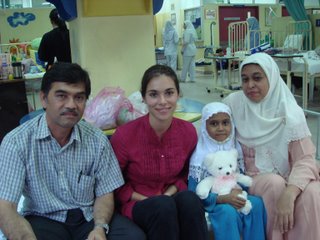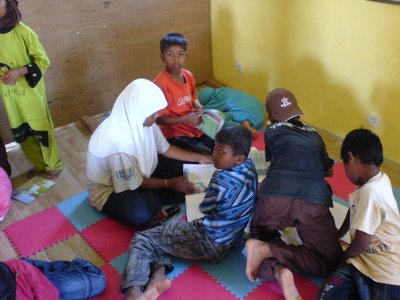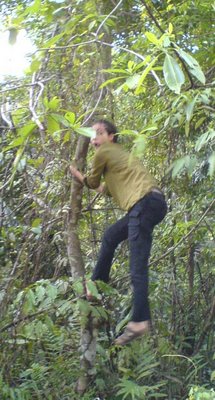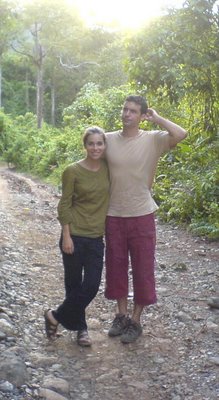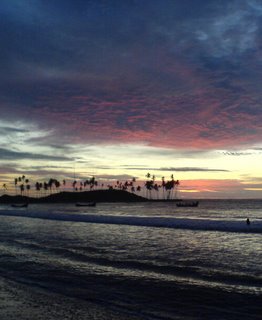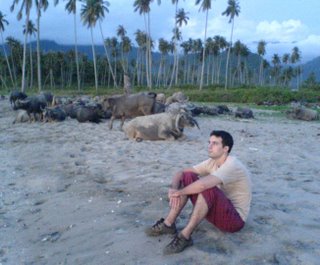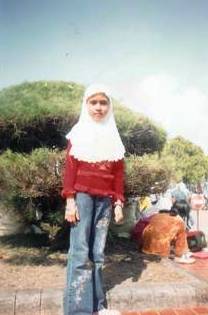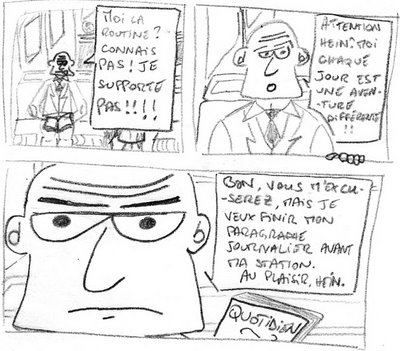Penang, île malaise où y en n'a pas, est un endroit fait pour le tourisme du Fun, des grands hôtels, des petits hôtels, des pancartes prometteuses de grands frissons et de sensations fabuleuses, de plongées sur des coraux de rêves, du meilleur poulet tandoori du pays, du plus grand bouddha allongé d’Asie du sud est (après les 2 autres plus grands allongés d’Asie du Sud Est mais c’est écrit en tout petit), la bière la moins chère du continent, blablabla…
C'est aussi un endroit où vivent ensemble des chinois, des malais, des indiens, en bonne intelligence semble-t-il, dans le respect de leurs cultures (musulmans, hindous, bouddhistes, confucéens, méthodiste, baptiste, adventiste…) et de leurs langues différentes (malais, hindi et des dialectes de leurs régions d origine, mandarin, cantonais, anglais). Tout ça a l’air de bien se passer et de bien se vivre ensemble, la vieille chinoise parle an anglais dans le bus au très vieux musulman et cède sa place gentiment mais ne s’assiéra pas à côté. Il y a des couples mixtes, mais ils ne sont pas légions non plus, il n’y a pas de réel ghettos, mais des quartiers à dominance quand même, et des lycées « pour jeunes filles chinoises », des écoles « couvent protestant »… On vit ensemble, on se mélange, mais pas trop quand même.
D’ailleurs nous avons vécu deux moments incontestables de discriminations négatives !
1/ A l’ambassade d’Indonésie, le garde (indien et hindou) refuse de me laisser entrer car je porte un short… Pourquoi ? Musulman ? Ramadhan ? Nous argumentons vivement car j’ai en fait un short ¾, qui cache les genoux, comme le précise les codes musulmans : il faut cacher les genoux (même si cela ne concerne que les musulmans en théorie). Il cède devant une argumentation persuasive qu’il ne comprend pas du fait de nos insuffisances linguistiques réciproques. 10 minutes plus tard entre un australien blond au yeux bleu, entouré dans un sarong pour cacher son short… il n’a apparemment pas convaincu… 10 minutes plus tard, entre un chinois avec un short ras-le-testicule type athlétisme… Et lui on lui a rien dit je parie. DISCRIMINATION !
2/ Nous allons nous balader dans un grand jardin botanique, réputé pour la nombreuse population de macaques. Juste avant d’entrer nous ne résistons pas à prendre une glace faite maison, 20 mètres avant. Nous pensions faire une promenade romantique, bras dessus bras dessous, petits oiseaux, gazon et violons. AHA illusion ! A peine avions nous fait deux pas dans le parc, que nous apercevons un singe, puis deux « Oh qu’ils sont mignons » et je porte la glace à mes lèvres. Les deux singes se figent, nous fixent puis commencent à avancer vers nous. Nous nous figeons, nous les fixons aussi, mais tandis que dans leurs regards grandissent l’avidité et l’agressivité, dans le notre c’est la compréhension de la situation, et une légère panique. Les singes courent vers nous, nous reculons, Emily sautille, je fais une tentative d’attaque feintée peu audacieuse pour voir si ça les impressionne, pas convaincant du tout, je rebrousse aussi comme une fillette. Le gardien nous sauve en criant, la tatane dans la main bien levée. Les singes fuient à distance raisonnable du gardien mais nous guette. Nous finissions notre glace à l’abri, et commençons enfin notre promenade romantique narguant les deux singes. A ce moment là une jeune malaise passe mangeant des morceaux de fruits sur une broche… Et les singes ne mouftent même pas… DISCRIMINATION !
C'est aussi un endroit où vivent ensemble des chinois, des malais, des indiens, en bonne intelligence semble-t-il, dans le respect de leurs cultures (musulmans, hindous, bouddhistes, confucéens, méthodiste, baptiste, adventiste…) et de leurs langues différentes (malais, hindi et des dialectes de leurs régions d origine, mandarin, cantonais, anglais). Tout ça a l’air de bien se passer et de bien se vivre ensemble, la vieille chinoise parle an anglais dans le bus au très vieux musulman et cède sa place gentiment mais ne s’assiéra pas à côté. Il y a des couples mixtes, mais ils ne sont pas légions non plus, il n’y a pas de réel ghettos, mais des quartiers à dominance quand même, et des lycées « pour jeunes filles chinoises », des écoles « couvent protestant »… On vit ensemble, on se mélange, mais pas trop quand même.
D’ailleurs nous avons vécu deux moments incontestables de discriminations négatives !
1/ A l’ambassade d’Indonésie, le garde (indien et hindou) refuse de me laisser entrer car je porte un short… Pourquoi ? Musulman ? Ramadhan ? Nous argumentons vivement car j’ai en fait un short ¾, qui cache les genoux, comme le précise les codes musulmans : il faut cacher les genoux (même si cela ne concerne que les musulmans en théorie). Il cède devant une argumentation persuasive qu’il ne comprend pas du fait de nos insuffisances linguistiques réciproques. 10 minutes plus tard entre un australien blond au yeux bleu, entouré dans un sarong pour cacher son short… il n’a apparemment pas convaincu… 10 minutes plus tard, entre un chinois avec un short ras-le-testicule type athlétisme… Et lui on lui a rien dit je parie. DISCRIMINATION !
2/ Nous allons nous balader dans un grand jardin botanique, réputé pour la nombreuse population de macaques. Juste avant d’entrer nous ne résistons pas à prendre une glace faite maison, 20 mètres avant. Nous pensions faire une promenade romantique, bras dessus bras dessous, petits oiseaux, gazon et violons. AHA illusion ! A peine avions nous fait deux pas dans le parc, que nous apercevons un singe, puis deux « Oh qu’ils sont mignons » et je porte la glace à mes lèvres. Les deux singes se figent, nous fixent puis commencent à avancer vers nous. Nous nous figeons, nous les fixons aussi, mais tandis que dans leurs regards grandissent l’avidité et l’agressivité, dans le notre c’est la compréhension de la situation, et une légère panique. Les singes courent vers nous, nous reculons, Emily sautille, je fais une tentative d’attaque feintée peu audacieuse pour voir si ça les impressionne, pas convaincant du tout, je rebrousse aussi comme une fillette. Le gardien nous sauve en criant, la tatane dans la main bien levée. Les singes fuient à distance raisonnable du gardien mais nous guette. Nous finissions notre glace à l’abri, et commençons enfin notre promenade romantique narguant les deux singes. A ce moment là une jeune malaise passe mangeant des morceaux de fruits sur une broche… Et les singes ne mouftent même pas… DISCRIMINATION !
